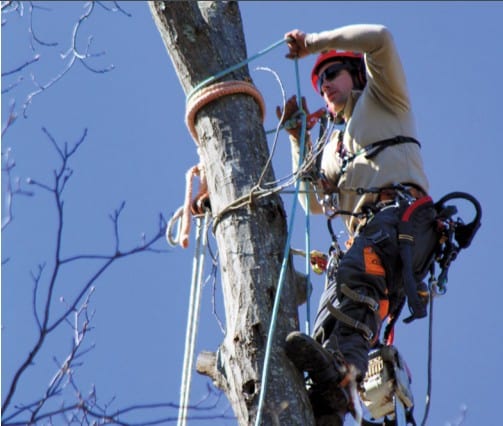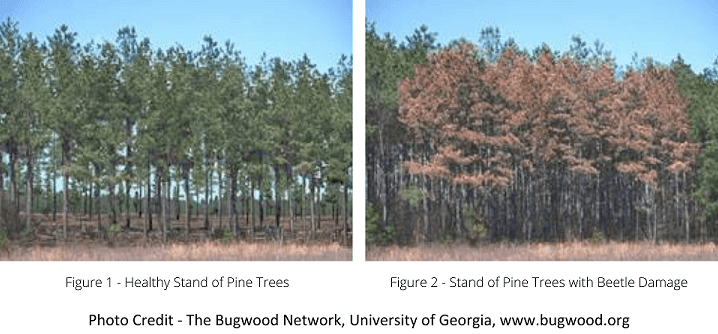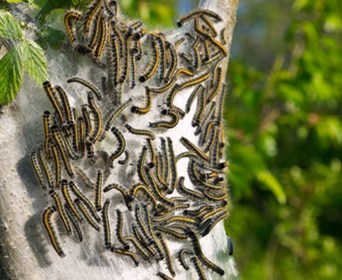Please enjoy this brief excerpt from the August 2018 TCIA Magazine!
By Janet Aird
Nich Maidment, owner of Asheville Arborists in Asheville, North Carolina, may have a slightly different take on tree care compared to many arborists in the U.S. since, he says, Asheville’s urban forest is a bit different compared to urban forests in most cities.
“Asheville is unique,” Maidment says. “Most properties are heavily wooded. Few yards have specimen trees.” Many people move to Asheville because they love the beauty of the mountains. They also tend to want a more natural approach to their trees. “They prefer to tiptoe around nature,” he says, “and they see the value of investing in their trees.”
An ISA Certified Arborist and tree climber, Maidment spent a semester in England studying at a university that offers an arboricultural degree. “In terms of consulting, arborists in England and the British in general value trees on a different level,” he says. “It made me appreciate the wisdom that Europe has and what they’re doing in terms of urban forestry.”
Heavy tree density in the area means most of Asheville Arborists’ work is hazard mitigation. That includes tree management for the long term. For the short term, crews prune to restore trees and improve their health, structure and appearance, as well as install cabling and bracing. They also do tree preservation during construction and tree removals. Their plant health care (PHC) includes controls for the hemlock woolly adelgid and preventive treatments for emerald ash borer.
When Maidment assesses a client’s trees, he balances the risk they will fall and what they might hit with the goal of maintaining the natural balance of the forest ecosystem. “A lot of things are outside of striking distance,” he says. “I make different recommendations, often depending on whether there are children or young adults there.”
Crews use an articulating crane to minimize the impact of their work. As much as possible, they leave habitat alone and leave debris behind in a way that’s both aesthetic and beneficial to natural processes.
Maidment started Asheville Arborists with business partner Craig Fender in 2010 and joined TCIA the same year. Maidment bought Fender’s interest in the company in 2017. The company serves western North Carolina. Approximately 85 percent of its customers are residential and the rest commercial.
Asheville Arborists has five full-time employees in the field and one part-time. Maidment constantly encourages them to improve.
“It starts with the type of people I’m hiring,” he says. “I really try to hire people who want to be arborists, who want a career and have passion for their work.”
Employees receive close to 50 hours of in-house training per year. Maidment pays for half of their outside training. He also encourages employees to participate in tree-climbing competitions. “I see huge value in that,” he says, “and a lot of my team has started to see the benefit, too.”
As part of the company’s safety culture, employees can say “no” to doing a job. “I give them room to make decisions for themselves,” he says. “Sometimes there’s no right or wrong, as long as they make their decisions while thinking about objectives and end results.”
Asheville Arborists earned its TCIA Accreditation in late 2017. According to Maidment, the Accreditation process helped him start to shift more responsibility to his employees. “If you hire good people, you don’t have to do everything yourself,” he says.
Roughly half of Asheville Arborists’ business is with repeat customers and referrals. “I’ve always wanted to do the right thing,” he says. “I’m proud of our reputation for doing things the right way.”
The company has an interesting way of communicating with potential customers. “One of the first things we do when we get an email from customers is get our insurance company to send our certificates to them,” he says. “That way, they’ve already seen our paperwork and we talk about that.”
Maidment says he advertises a little on the Internet and has a website and one print ad. Word of mouth and the internet are the easiest and most accessible ways to advertise, he adds.
“Accreditation was always a goal of mine,” Maidment says. “I always wanted to do what was right for trees – managing them ethically and morally. Accreditation confi rmed that I was doing everything right.”
When he started the business, Maidment found the Accreditation checklist. He started working on it about four years ago, before he actually enrolled in the Accreditation program.
“I probably created two-thirds of the templates on my own by trial and error,” he says. “I spent a horrendous amount of energy on it. Spend the $725 for the zip drive with all the templates on it. It’s worth every penny.”
Accreditation strengthened his knowledge of tree work, department of transportation safety components and how to run a business, but Maidment says he didn’t have to change very much of what he was already doing. He did improve the company’s record-keeping, however. “Some of it we weren’t doing. Some wasn’t as organized or systematic as it should have been. Now we don’t have to spend time trying to find paperwork.”
Accreditation has also benefited the company’s employees.
“When I started working for a tree services company, I felt like I was getting the short end of the stick (as an employee),” Maidment says. “Recently, I was able to pay for 50 percent of my employees’ health insurance. It’s been a goal of mine for a long time. It coincided with my workers’ comp coming down 15 to 20 percent. It’s almost dollar for dollar. They earned it. I’m not out there doing the job.”
In the future, Maidment says, he’s going to use TCIA’s Tree Care Academy modules for training, which will help him systematize the company’s training practices. He’s also going to use TCIA’s templates to make updates in the company. One of the advantages of the templates, he says, is that everything is done in a consistent manner with the idea that more can be added later.
Maidment is expecting his company will have two full crews and a larger PHC department within the next year or so. He’s also looking for a high-caliber, experienced person to do the business work he’s doing now.
“When I first started in this business, I wanted to know how to be a better ground worker, feller, climber,” Maidment notes. “Then I got into more of an arborist path and wanted to be the best general arborist I could be. Then I realized I needed to be a good business owner, so I started working with a business coach, and it became apparent that I’d have to work at least one day a week on the business. Now I want to get more into the arborist realm again.”






